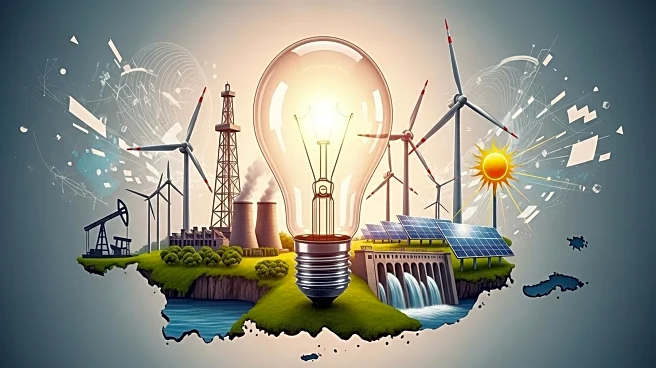What is the story about?
What's Happening?
A recent study has analyzed the energy transition scenarios for Puerto Rico, focusing on uncertainties in moving towards renewable energy sources. The study outlines three scenarios: Business as Usual (BAU), Fully Renewable (FR), and Fully Decarbonized (FD). It uses a three-stage framework to assess the cost-effectiveness and environmental impact of each scenario. The BAU scenario shows a natural increase in renewable energy adoption due to declining costs, despite no explicit policy mandates. The FR and FD scenarios aim to meet ambitious renewable energy targets set by PREPPA, with the FD scenario achieving total decarbonization by 2050. The study employs a probabilistic cost analysis to evaluate the expected costs under various uncertainties, including technology costs, fuel prices, and hurricane impacts.
Why It's Important?
The findings of this study are significant for policymakers and stakeholders in the energy sector, as they highlight the economic and environmental implications of different energy transition pathways. The study suggests that market forces alone may drive significant renewable energy adoption, but achieving full decarbonization requires strategic planning and investment. The analysis of uncertainties, such as hurricane frequency and organizational inefficiencies, underscores the need for robust infrastructure and policy frameworks to support a resilient energy system. The study's insights could guide future investments and policy decisions, potentially influencing the broader U.S. energy transition efforts.
What's Next?
The study indicates that further research and planning are needed to address the identified uncertainties and optimize the energy transition strategies for Puerto Rico. Policymakers may need to consider additional measures to enhance grid resilience and reduce vulnerability to extreme weather events. The findings could prompt discussions on improving organizational efficiency and incorporating climate change projections into energy planning. As Puerto Rico moves towards its renewable energy goals, stakeholders may explore new technologies and partnerships to support sustainable development.
Beyond the Headlines
The study's focus on uncertainties highlights the complex interplay between economic, environmental, and social factors in energy transitions. It raises ethical considerations about the equitable distribution of energy resources and the potential impacts on local communities. The emphasis on organizational inefficiencies points to broader systemic challenges that could affect the success of renewable energy initiatives. These insights may encourage a more holistic approach to energy planning, considering not only technological advancements but also social and governance aspects.















